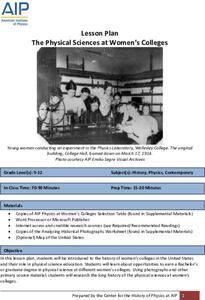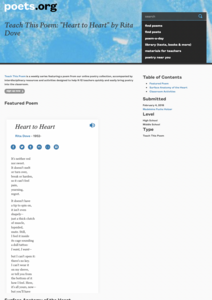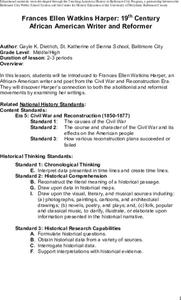Newseum
'The Press and the Civil Rights Movement' Video Lesson
Scholars watch a video featuring journalists who covered the civil rights movement, then respond to questions on a viewing guide. The video features interviews with participants and original news footage from the 1950s and 1960s. In...
Center for History Education
Guatemalan Coup of 1954: How Did the Cold War Influence American Foreign Policy Decisions?
Was it all about the bananas—or the fear of a communist threat? Young historians use a history lab to examine documents from the American-led 1954 Guatemalan coup. Using graphics, government documents, and speeches, they examine the...
Newseum
Before and After: Analyzing Turning Points in History
Scholars examine front-page news stories to gather evidence about significant historical events. They hypothesize how these events changed people's lives who lived through them and how they continue to impact lives today.
K20 LEARN
Forgotten Figures: The Civil Rights Movement
Most have heard of Dr. Martin Luther King, Malcolm X, and Rosa Parks, but few recall Elizabeth Jennings, Samuel W. Tucker, or Ada Lois Sipuel Fisher. Young historians research and then develop a presentation about the contributions of...
American Institute of Physics
The Physical Sciences at Historically Black Colleges and Universities
The history of science instruction at Historically Black Colleges and Universities (HBCUs) is the focus of a instructional activity that explores the early challenges these institutions faced in accessing equipment for their labs and...
American Institute of Physics
The Physicist's War: Dr. Herman Branson and the Scientific Training of African Americans during World War II
The mobilization of soldiers for World War II resulted in a worker shortage in the defense industries, especially in the fields of physics and other sciences. The Engineering, Science, and Management War Training program (ESMWT) was...
American Institute of Physics
The Physical Sciences at Women's Colleges
After a brief introduction to the history of women's colleges in the United States and a discussion of the resistance such institutions faced, young scientists investigate seven traditionally women's colleges and their physics programs....
National Woman's History Museum
Ida B. Wells: Suffragist and Anti-Lynching Activist
Suffragette, investigative journalist, and civil rights activist Ida B. Wells is the focus of a lesson that has young historians study the work of this amazing woman. Scholars watch a video biography of Wells, read the text of her speech...
Anti-Defamation League
Shirley Chisholm: Unbought, Unbossed and Unforgotten
A 13-page packet introduces high schoolers to a lady of amazing firsts. Shirley Chisholm was the first Black woman elected to Congress, the first Black woman to run for President of the United States, and a leader of the Women's Rights...
Anti-Defamation League
Women's Suffrage, Racism, and Intersectionality
The Nineteenth Amendment granted women the right to vote—as long as they were white. High schoolers read articles and essays about racism in the suffrage movement and consider how intersectionality played a role in the movement. Scholars...
Teaching Women's History
Georgian Women
Britain was and is a stratified nation. History sleuths investigate the Georgian Era (1714-1830) of British history to gain an understanding of how the roles women played during this period were influenced by class, race, and religion....
K20 LEARN
Manifest Destiny: U.S. Territorial Expansion
A close examination of John Gast's painting "American Progress" launches a study of the concept of Manifest Destiny used to justify United States' policy of westward expansion. Young historians read statements from persons with different...
K20 LEARN
The Conflict at the Washita River: The Indian Wars in Indian Territory
"Battle" or "Massacre"? Words matter, especially when labeling historical events. That's the big idea in a lesson about the 1868 conflict at the Washita River. After examining two images of the event, groups read and discuss articles...
Learning for Justice
The Color of Law: Creating Racially Segregated Communities
It is pointed, powerful, and painful! The first of three lessons about laws and practices that support inequality looks at how government policies created and reinforced segregated communities. Young social scientists read excerpts from...
National Woman's History Museum
Dolores Huerta and the Delano Grape Strike
Few have heard of Dolores Huerta and her part in organizing the California farm workers, establishing the United Farm Workers union and orchestrating the Delano Grape strike. High schoolers consider why this powerful woman has been...
Teaching for Change
Selma in Pictures: Socratic Seminar
Photographs from the freedom movement in Selma, Alabama serve as the basis of two Socratic Seminars. Class members prepare for the seminars by closely observing the images, form a hypothesis, and use evidence from photo to support a...
Museum of the American Revolution
Dissecting the Declaration
Delve into the past to understand the issues that led to the Declaration of Independence. Academics read excerpts from the Declaration of Independence and take a virtual tour of the American Revolution Museum. The resource explains how...
Museum of the American Revolution
Dunmore's Declaration
To fight or not to fight, that is the question. A thought-provoking activity focuses on the Dunmore Declaration that promised to free enslaved people who chose to fight for the British during the American Revolution. Scholars read the...
Academy of American Poets
Teach This Poem: "Heart to Heart" by Rita Dove
Take heart! Here's a lesson that will encourage learners to notice details. After listening to Sarah Vaughan singing "My Funny Valentine" and noting how the word heart relates to Valentine's Day, scholars observe a human heart image....
Academy of American Poets
Teach This Poem: “Dead Stars” by Ada Limón
Pay attention! A lesson featuring Ada Limon's poem "Dead Stars" is designed to help learners develop their noticing skills. Class members first study the constellation Orion's image and list what they notice and how the image makes them...
Academy of American Poets
Teach This Poem: "Maps" by Yesenia Montilla
After examining a physical map of the world, learners conduct a close reading of Yesenia Montilla's poem "Maps." They note the interesting words and phrases, the way the poem is structured, and list questions they might have. After...
Center for History Education
Frances Ellen Watkins Harper: 19th Century African-American Writer and Reformer
Although some African American abolitionists—such as Sojourner Truth and Frederick Douglass—are well known, others, like Frances Ellen Watkins Harper, remain in the shadows of history. Harper was a poet and activist who played an...
Center for History Education
Speaking Freely In the Soviet Union's Autocratic Government
Speak your mind! The instructional activity explores the difference in free speech between the United States and the Soviet Union. Academics review the constitutions of both governments, political cartoons, and case studies to understand...
National Endowment for the Humanities
García Márquez’s Nobel Prize Speech: “The Solitude of Latin America”
To conclude a study of One Hundred Years of Solitude, class members analyze Gabriel Garcia Marquez's Nobel Prize in Literature acceptance speech. After a whole-class discussion of the main ideas in the speech, individuals draft a...

























